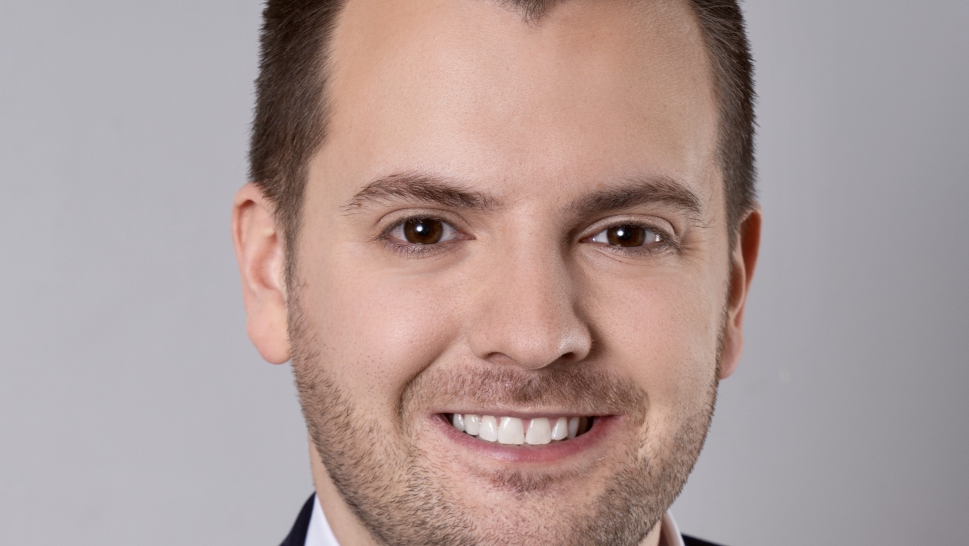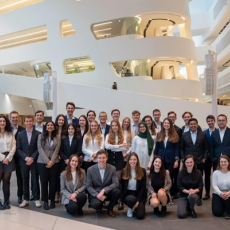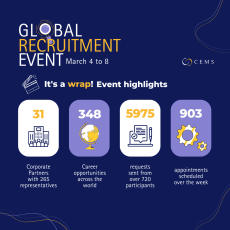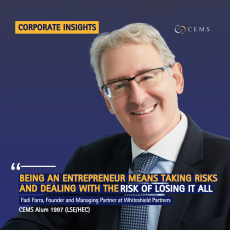Chief of Staff to the CEO is a role that is gaining traction in large organisations, particularly when a chief executive is stepping into a new role and brings with them a change mandate. This is very much the case of Unibail-Rodamco-Westfield (URW), a world-class owner and operator of shopping and lifestyle destinations in major cities across Europe and the US.
In 2018, Unibail-Rodamco acquired Australian shopping centre company, Westfield, which entailed a very significant and fast extension of the organisation’s international footprint; one that effectively doubled their presence without geographic overlap. For the executive team it was a critical moment, requiring senior decision-makers to be “everywhere simultaneously.” It was at this moment that the position of Chief of Staff was created. And it is a position that CEMS graduate, Alejandro Estruch, has held since the start of 2021.
“In large organisations where you have a lot of key initiatives in flight at the same time, there is a real need for very structured decision-making and that means identifying the crucial moments or milestones in each project and addressing them at the right time,” says Alejandro. “The role of the Chief of Staff is to convey to the chief executive where each project is at; to coordinate with the executive team ensuring progress is being made and socialised, and that objectives and direction are understood. And it’s about pinpointing those major decisions that trigger CEO approval, and bringing him in with the right context.”
It is a role that in essence is all about expanding and multiplying the CEO’s reach, he says.
Alejandro was appointed to Chief of Staff to the CEO when Jean-Marie Tritant took up the reins as global Chief Executive Officer of the organization in January 2021, following the Westfield acquisition. They had worked closely together in Australia, the US and Europe on the post-acquisition integration process which was successfully completed inside a year and a half. Their strong working relationship and Alejandro’s understanding of business processes in Europe were key to this promotion, he says.
“What the company and Jean-Marie Tritant needed was someone capable of understanding the company's priorities across the business, outlining and structuring a roadmap to deliver on those, and coordinating the involvement of the critical stakeholders, in particular, the CEO.”
Influencing others
Present in 12 countries and owners of all Westfield malls in Europe and the US, URW is a large and complex organisation that makes significant, capital-intensive investments in real estate across different geographies. Being Chief of Staff to the CEO carries a lot of responsibility, and no one day will resemble another. That said, there are certain rhythms or cycles to the work that lend it a discernible structure, says Alejandro.
“In its essence, my role has three dimensions. The first is to plan and prepare the meetings that we’re bringing our CEO into and ensuring that we’re addressing the right questions and calling out the decisions that need to be made,” he explains. “The second piece is actually being in the room to understand the CEO’s thinking and getting a sense of his perspectives, thoughts and direction. And then there’s the follow up, which is all about bringing those insights back to the different teams to enable them to connect the dots and focus on their goals and priorities.”
In a sense, he adds, it’s a role that is all about enabling other people to do their roles better.
“My job is relatively limited in terms of pure production time. Most of my day is spent in meetings, primarily influencing the work of others.”
The importance of soft skills
To influence other people effectively, you first need to be able to listen, says Alejandro. And you need to have the soft skills – the interpersonal capabilities – to build trust and credibility.
“One of our US executives puts it really well: you need to listen to be wrong,” he says. “We all have a tendency to want to confirm our own views or beliefs when we’re listening to other people. But my job is to ensure that we’re making the right decisions, and that means being able to stop and ask yourself why someone has a different argument or position, and whether their perspective can help me pressure test my own assumptions.”
Alejandro calls this “active listening.” Add to this the capacity to align others around the CEO’s vision while ensuring they feel heard, engaged and accountable, and you have an essential set of interpersonal skills to do the job – skills, he says, that he began to build as a CEMSie.
“I remember exploring soft skills as a CEMS student and thinking: yes, they are nice to have but what will I do with them? It’s when you actually get into the world of work that you realise just how critical they are,” he says. “You can walk into any company and you have a base though you still need to learn how everything works. But what you can bring to accelerate that process are all these soft skills; this understanding of intercultural and international business environments and being able to approach people in a way that is clear and engaging. These are skills that help you avoid the misunderstandings or lapses in communication that impede you from getting the behaviours that you are looking for.”
In prioritising soft skills, CEMS was very much “ahead of its time,” he adds.
Keeping an open mind
Young people at the start of their career would do well to build their interpersonal skills, says Alejandro. There is also merit in keeping an open mind.
His trajectory at Unibail has deviated significantly from his own initial expectations – and that’s no bad thing, he insists.
“I was recruited into the HR function from ESADE, which was not at all what I wanted to do at first. But URW’s HR lead for Spain encouraged me to try it out as way to gain fuller exposure to how the company worked, and the resources it needs across its different functions to achieve business goals. It fast-tracked my understanding of the organisation, and really enabled me to see the value and strategic importance of enabling others to optimise their work.”
As an organisation, URW offers new recruits a significant amount of flexibility and space to “try something out” and pivot, according to interests, strengths and abilities. This includes shifting to different corporate functions or pursuing the company’s global graduate programme.
“I think it’s important for CEMSies and other young people to try things out and experiment a bit – even if you don’t think it’s for you. It’s key to be open and to build and maintain a learning mindset so that you constantly discover the value where you might not have seen it before. You might be surprised by what you learn!”



